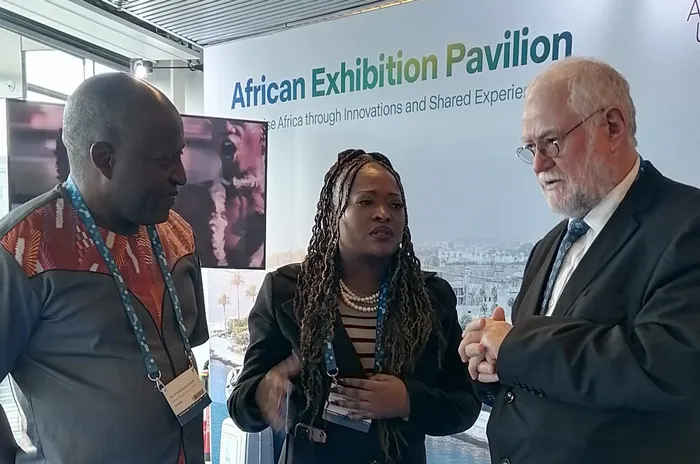World Water Week 2023: We are here to learn - deputy minister

The deputy executive director of the Department of Water Affairs, Dr Elijah Ngurare, the Deputy Minister of Water and Sanitation, Judith Tshabalala, and the former president of the African Ministers' Council on Water, Carl Hermann Schlewein, at the 2023 World Water Week conference that got under way at the Stockholm International Conference Centre in Stockholm, Sweden, on Monday, August 21, 2023. Picture: Boipelo Mere, DFA
STOCKHOLM, Sweden - The Deputy Minister of Water and Sanitation, Judith Tshabalala, welcomed South Africa’s delegates to the 2023 World Water Week conference at the Stockholm International Conference Centre on Monday, where she will participate in different panel discussions with various representatives from across the globe on different water challenges facing the world.
Tshabalala was accompanied by South Africa’s ambassador to Sweden, Brigitte Mabandla.
Hosted by the Stockholm International Water Institute (SIWI), the World Water Week (WWW) conference commenced on Monday and will run until Thursday, with a focus on innovation at a time of unprecedented challenges facing water security around the world.
The annual conference, under the theme “Seeds of Change: Innovative Solutions for a Water-wise World”, is the global leader on water issues and attracts diverse participants and global professionals in the water sector.
Tshabalala will engage with global leaders to deliberate on and address pressing water challenges facing South Africa and the African continent.
WWW invites global leaders to rethink how to manage water and come up with ideas, innovations and governance systems required in a more unstable and water-scarce world.
Various South African water entities that are participating in the event include the Trans-Caledon Tunnel Authority, Lesotho Highlands Water Project, Magalies Water, Bloem Water and the Breede Olifants Catchment Management Agency.
The different entities set up exhibition stalls on the services that they provide.
Tshabalala had a meet-and-greet session with the two 14-year-old learners from Emang Mmogo Comprehensive School in Kimberley, Northern Cape, Kelebogile Abrahams and Mahlohonolo Mosia, who won the South African Junior Water Prize competition.
The competition is spearheaded by the Department of Water and Sanitation (DWS).
Speaking during the conference, Tshabalala explained that the event is an opportunity to learn and to demonstrate how the DWS, together with research institutes and the water boards, is working to ensure sustainability of this scarce resource.
“I am also looking forward to participating in the high-level ministerial panel discussions on global water and sanitation issues,” said Tshabalala.
“This will be a platform to exchange ideas and to form continued collaborations with water experts, academics and policymakers. South Africa’s participation in the World Water Week conference will indeed bring solutions in the country’s quest to find innovative ways of improving its water and sanitation services to the people.
“This is a platform where all the global leaders and experts in the water sector come together to discuss ways to improve management to ensure that there is sustained provision of water in the world.”
Highlighting the key water challenges facing South Africa, Tshabalala elaborated on climate change, floods and electricity cuts that the country is battling with.
The deputy minister noted that the different partnerships have the potential to minimise the allocation of poor-quality water to the people.
“We are here as part of the world to find ways and see what we can do to ensure that water is being treated. There are a number of new ideas brought forward by different water sectors that can help address the challenges.
“Climate change is showing us flames, the droughts in the Northern Cape, Tshwane where the water system collapsed, and the floods and disasters in KwaZulu-Natal.”
Tshabalala also touched on the issue of the recent cholera outbreak that pointed to the Vaal River.
“Even though cholera was not found in the water by the Department of Health, we continue to ensure that we treat our water.”
“All spheres of government - the local, provincial and the national - have to come together to look towards ensuring that quality water is provided to the people.”
Mabandla meanwhile highlighted the good international relations between South Africa and Sweden.
“I should mention that you are in a country that has had a good multinational relationship with South Africa for many years, and it is pleasing that critical and important issues of water will be discussed here.
“I wish you well in your engagements in this week-long conference and hope that the resolutions achieved here will add more value to water service management for South Africa,” said Mabandla.

